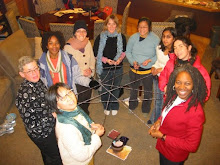Listeners of NPR know that All Things Considered host Michele Norris has just published a memoir, THE GRACE OF SILENCE, and is currently touring. Last night I attended her talk in Milwaukee.
I was torn about attending because the ticket price, which included her book, was steep, and I have long held mixed feelings about Norris. On one hand she is an extremely capable, smooth, insightful journalist. On the other hand, is this enough?
I admit I hold white people and people of color up to different standards. This is because we hold different levels of status in USA society. Study this site to understand what I mean. Because of historic oppression, people of color continue to experience disadvantages, even though Jim Crow is technically over.
Michele Norris is a successful African American woman in the overwhelmingly white culture of public radio. As such I expect much of her and can’t help being disappointed when she doesn’t deliver. Not only do I expect her to bring national attention to issues of race (which she does to some degree), but also to help transform NPR to truly reflect the nation’s demographics, and to leverage her power to dismantle racism/white supremacy.
I hold Obama up to that standard as well, so like many people of color, am disappointed that he isn’t doing more to actively dismantle racism/white supremacy. On the other hand, I know what he is up against in Washington: the embodiment of white supremacy which is the top echelon of our government. I recognize how hard it is for people of color to claw to the top when their parents were not able to provide the advantages that upper class whites have long held close. And when these individuals do climb to the top of their field, it’s often at the expense of alienating themselves from other people of color, by serving as the exception, the token.
Last night I found myself getting extremely restless. Norris’s talk was interesting, painting a portrait of racism/white supremacy in the USA in the 1940s-1960s for her parents and grandparents. But the problem with such discussions is that they gloss over the fact that racism/white supremacy continues. In fact, in the 21st century, “white supremacy” is a bigger issue than “racism” because the former assumes a system, while the latter implies personal actions of bigotry.
We’ve all been trained to be polite and to act justly in personal affairs, but how successful have we been in dismantling centuries of economic, educational, and political injustice? Milwaukee’s poverty rate has just soared to 27%. 4 out of 10 children in our city live in poverty, and these children are overwhelmingly African American. Can anyone look me in the eye and claim we do not live in a system of racism/white supremacy?
Personal stories like Norris’s are important for informing us about the depth of racism/white supremacy in our nation, but as she stood up there center stage—beautiful, eloquent, light skinned and straight haired—like the symbol of Obama, she made us feel like the work had been done. She made us feel self-congratulatory: “Oh, those black people, and what they’ve been through…Thank God, it’s over….” And now we are off the hook.
If Norris was dark-skinned with curly hair and a body shape more like Gabby Sidibe, would she have been hired by ABC News? If she had grown up in a working class black neighborhood and her speech more Ebonics-tinged, would she have been hired by NPR? Her appearance and upbringing in White society gave her enormous privilege, which she never acknowledged during the talk or Q/A. The mostly white audience, like the listeners of NPR, felt at ease with her.
But facing racism/white supremacy should make us uneasy. Confronting injustice should make our hearts race. Ongoing systems of privilege that disenfranchise millions should bring us to our feet, should be intolerable and unbearable.
I know, I know, Michele Norris cannot do it all, and neither can Obama. But WE must step up to the task. WE must compile our own family stories. We must understand the role racism/white supremacy has played in our own lives, then actively dismantle these systems.
Me? I’m struggling to find the ways. I run a nonprofit yoga school to bring wellness to underserved communities. I am teaching 2 new classes at Alverno on Repairing Racial Harm and Healing Collective Trauma. I’m working on building a yoga/organic farming/housing cooperative in the working class, mixed race neighborhood where I live. I’m giving away as much money as I can. I help run EmergentSee Racial Reconciliation Dialogues. It’s not enough, not nearly enough. But we must find the ways, creatively, joyfully, to dismantle injustice in our communities, and uplift the children of our city so that 0 out of 10 tolerate poverty.
At some point, silence is no longer graceful.
Peggy Hong
1 October 2010
Friday, October 1, 2010
Subscribe to:
Posts (Atom)


